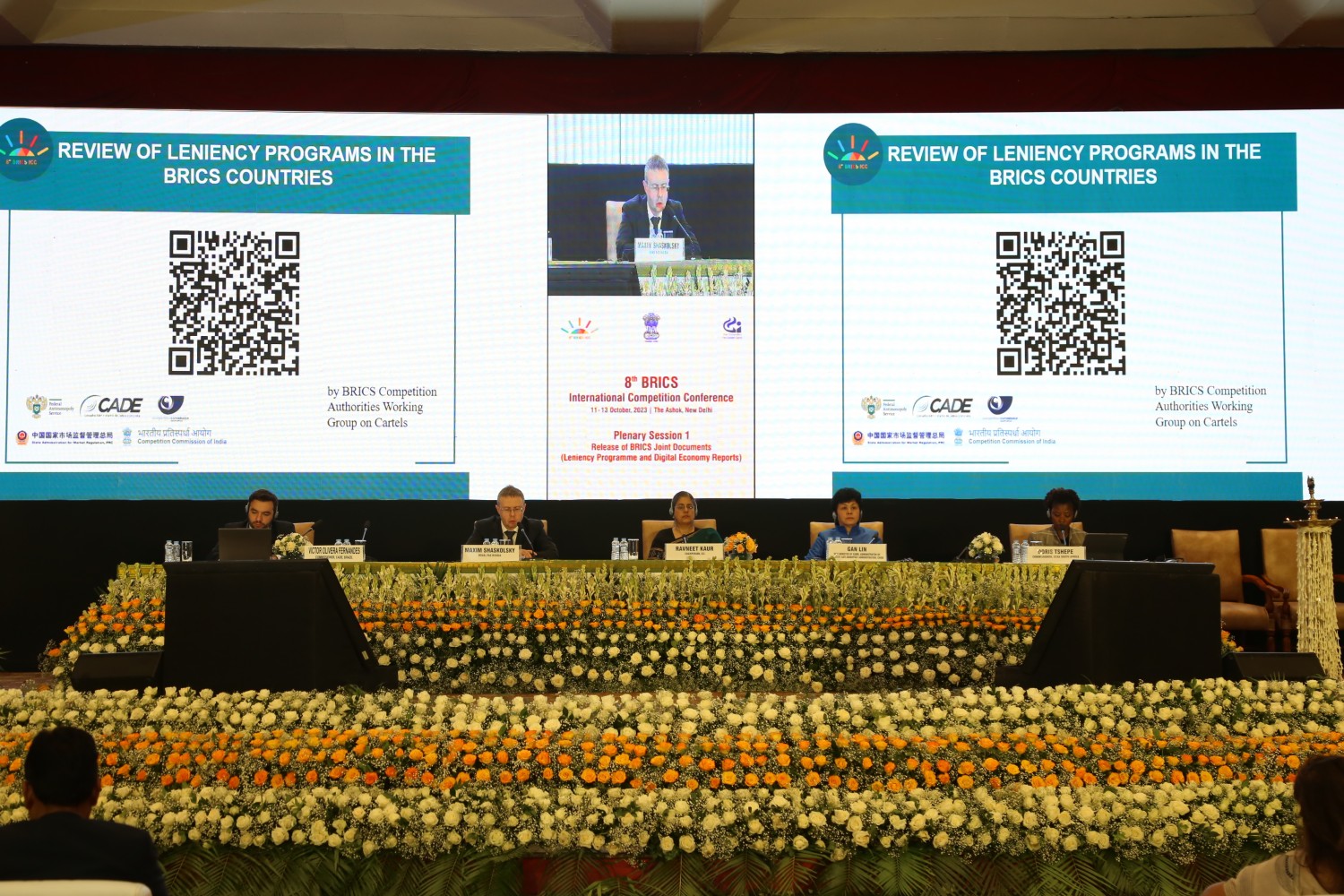The International BRICS Competition Law and Policy Centre of the HSE University (BRICS Centre) held the VIII CUTS-CIRC Conference on Competition Regulation and Development in New Delhi on October 9-10. The event was organized jointly with the Centre's partners — India's oldest research institutes in the field of consumer protection — the CUTS International and the CUTS Institute for Regulation & Competition (CIRC).
The Organization for Economic Cooperation and Development (OECD) and the European University Institute (EUI) were also partners of the conference. The event was supported by the Competition Commission of India (CCI) ahead of the BRICS International Competition Conference.
The discussions were attended by leading experts from the UN, OECD, competition authorities of the BRICS countries, EAEU, Uzbekistan, Malaysia, Egypt, African regional associations COMESA and ECOWAS, as well as academics and public figures from India, China, Hong Kong, France, Italy, Russia, Brazil and other countries — a total of 26 countries were represented.
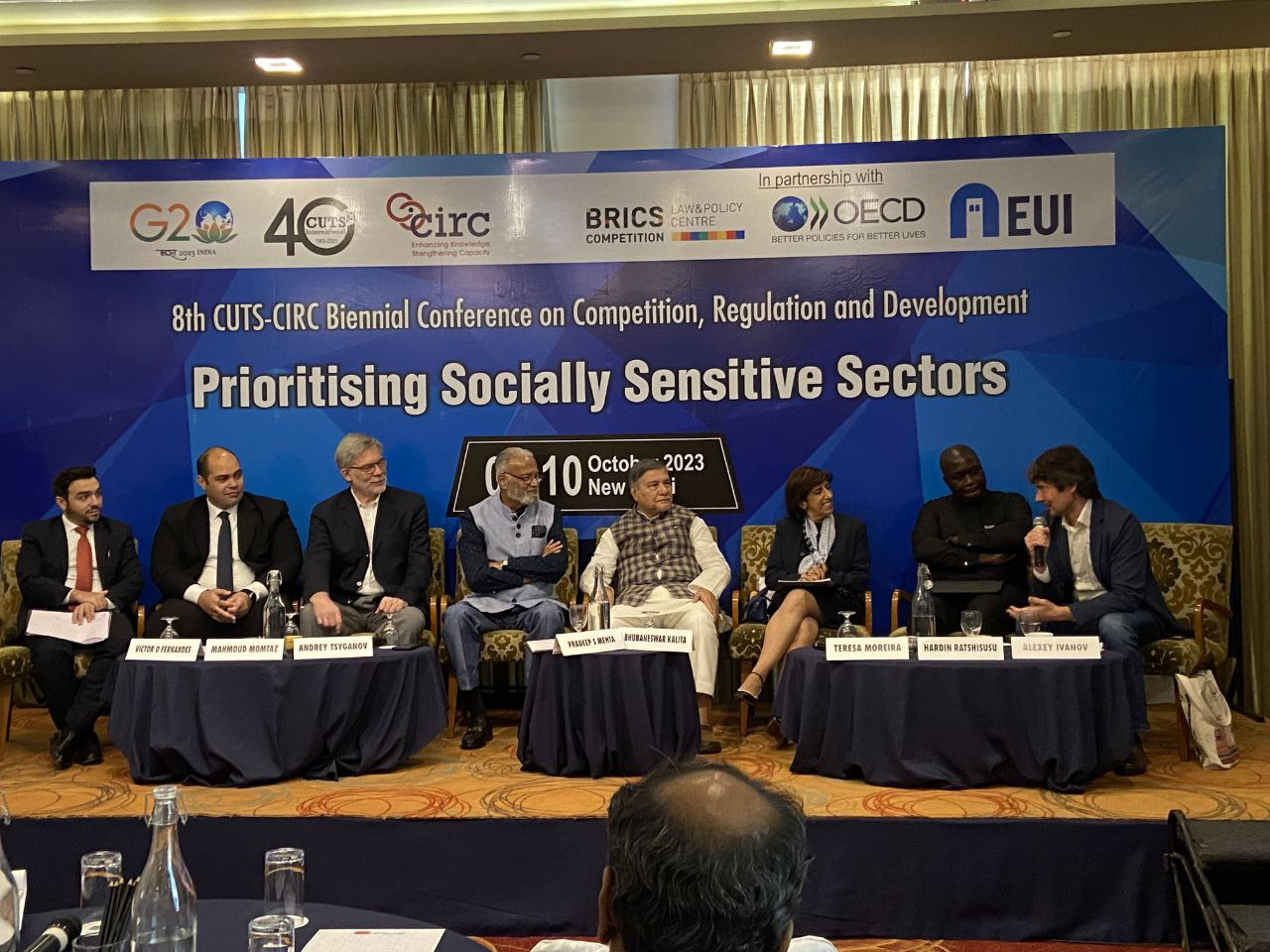
The growing multidimensional crisis (polycrisis) caused by pandemic, growing armed conflicts, climate change and imbalance of the global economy creates new challenges for antitrust policy worldwide. For antitrust regulators, socially sensitive areas of economic life - health care, agriculture, education, digital development, etc. - are taking center stage. It is these aspects of the work of antitrust regulators that became the key aspects for discussion.
Teresa Moreira, Head, Competition and Consumer Policy Branch, Division on International Trade and Commodities, UNCTAD, opening the conference, highlighted the organization's efforts to include developing countries in an equal dialogue on the rules of the world economy with the world's leading powers. Today's highly polarized world needed tools to increase solidarity and cooperation more than ever, she said. Antitrust policy, in turn, has great potential for inclusive international cooperation to level the playing field for fair economic competition and overcome inequalities in the world, as provided for by the 1980 UN Set of Principles and Rules on Competition, the only universal international treaty on competition protection to date, Ms. Moreira said. Ms. Moreira also emphasized the key role of the BRICS Competition Centre in studying the problems of competition in the world's food markets — one of the most important socially important sectors of the global economy today.
"It was colleagues from the BRICS Competition Centre who first brought the thorny issue of global food chains to the level of international antitrust discussion at UNCTAD in 2015 and since then have continued to pursue this topic in cooperation with key developing countries, which gives hope for more effective antitrust policies in global food markets that are so desperately needed today,"
Ms. Moreira concluded.
Mahmoud Momtaz, Сhairman of the Egyptian Competition Authority (ECA), and Tembinkosi Bonakele, Ex-Commissioner of the South African Competition Commission andProfessor of the Wits University (Johannesburg), also noted the critical importance of focusing the international antitrust debate on food, with an emphasis on the workings of global supply chains, especially in the turnover of key food commodities such as grain, which was the subject of a presentation by Alexey Ivanov, Director of the BRICS Competition Centre.
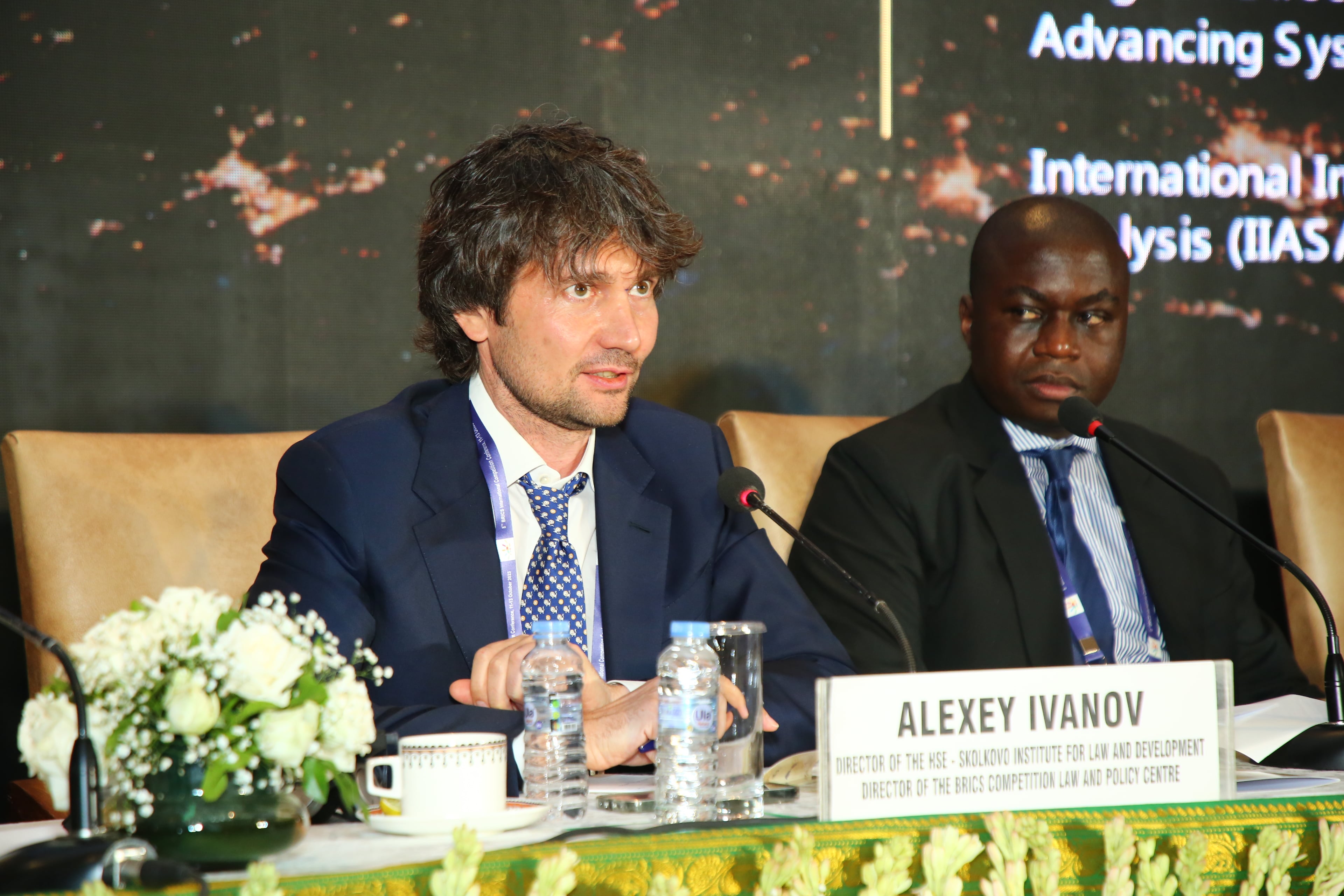
In his report, he described key antitrust challenges to international grain trade, such as oligopoly of global grain traders, information asymmetry and speculative pricing in exchange and OTC derivatives markets, export restrictions, multiple entry barriers and logistics bottlenecks, etc., and suggested possible joint antitrust responses to these challenges by the BRICS countries in an enlarged group that includes Egypt, Iran, Saudi Arabia and Argentina — important players in the global food market.
Dina Waked, Associate Professor at Sciences Po Paris' Law School, also noted the increasing role of taking into account the workings of global food value chains in antitrust analysis, which is crucial for developing countries still living with the traditional "Chicago" methodology of market analysis, enshrined in their law in the 1990s during the period of widespread antitrust regulation in the world.
An important discussion at the conference also focused on the regulation of digital platforms and ecosystems, which are playing an ever-increasing role in the economy. In the session with the participation of the heads of antitrust agencies of Kazakhstan, Uzbekistan and Russia, Daria Kotova, Expert, the BRICS Competition Centre, presented the developments in the field of ecosystem regulation on the example of Yandex, focusing on the problems of algorithmic pricing in the sphere of cab services in the markets of these countries. Thomas Cheng, Professor of the University of Hong Kong, highlighted the problem of algorithmic pricing as a way to strengthen market power at the session. Similar issues were raised in a market study conducted by the Competition Commission of India, also presented at the conference.
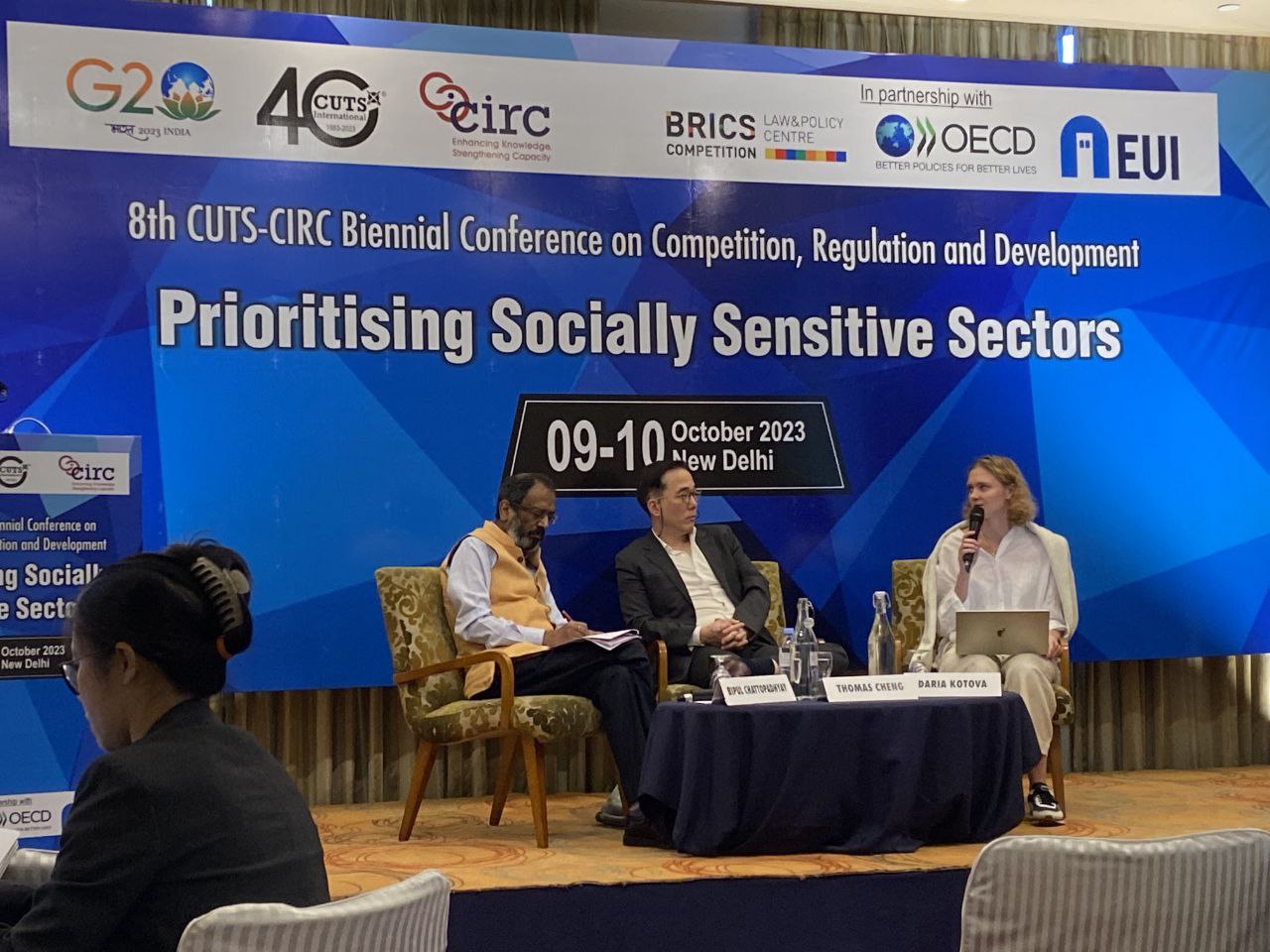
Drug supply, and in particular access to modern innovative medicines, is significantly hampered in developing countries due to the rigid international intellectual property regime, which is unbalanced in favor of global pharmaceutical companies, said intellectual property advisor Lina Menghani, Global IP Consultant for the Médecins Sans Frontières (MSF), in her presentation at the session on public health. Samir Kulkarni, Professor at the University of Mumbai and one of India's leading experts in the field of biologic drugs, agreed with her opinion. Representatives of antitrust regulators spoke in favor of more active work to revise international rules of intellectual property rights protection in order to reduce the rent income of global monopolies and, in general, to reduce monopolization of key scientific achievements in the field of biotechnology for more active innovative development of this sphere in the world, which is also what the BRICS Centre has been advocating for many years in Russia and internationally.
In the final session of the conference, Eleanor Fox, Professor at New York University School of Law, and Frederic Jenny, Chairman of the OECD Competition Committee, also noted the importance of developing new approaches to antitrust regulation of socially important markets in the current environment.
"The antitrust over the last 25 years of the triumph of the 'Washington consensus' has practically self-distracted from solving the key problems of our time, and this is very bad for the world economy and social development,"
concluded Eleanor Fox. To help overcome this negative trend, according to her, more involvement in the dialog on new principles of antitrust regulation of developing countries can help.
In his closing remarks, Hardin Ratshisusu, Deputy Commissioner, Competition Commission of South Africa, supported the joint initiative of the BRICS Centre presented at the conference by Elena Rovenskaya, Program Director of the International Institute for Applied Systems Analysis (IIASA), to fully incorporate the UN sustainable development goals into antitrust analysis as important non-economic indicators of the effectiveness of antitrust enforcement. According to him, the inclusion of the public interest of development in South Africa's antitrust policy has already yielded significant results, increasing economic inclusion of historically oppressed segments of the population and reducing economic and social inequality. A more systematic incorporation of sustainable development goals in all their diversity into antitrust analysis will help spread South Africa's successful experience to other countries and create conditions for inclusive development of antitrust law in the world, Hardin Ratshisusu concluded.
"It is critical to create a new type of consensus in which the common good really matters. The time has come for new antitrust legislation. It should become a tool for solving social problems, a real instrument of anti-crisis policy,"
Alexey Ivanov agreed with him in his closing remarks.
A similar point of view was expressed by Víctor Oliveira Fernandes, Commissioner, CADE, Brazil, who reminded that next year Brazil will chair the G20, which will make it possible to bring the aspirations of antitrust experts and regulators to the political level as well.
Antitrust agencies of the BRICS countries unite
The BRICS International Competition Conference was held in New Delhi on October 12-13, following the conclusion of the CUTS-CIRC Conference. It is held every two years and serves as a platform to promote mutual learning, cooperation and exchange of experience among the competition authorities of the BRICS countries.
At the opening plenary session, Maxim Shaskolsky, Head of the FAS Russia, noted the importance of expert support for the activities of BRICS competition authorities provided by the BRICS Competition Centre.
"I propose to more actively use the potential of the Centre and involve its experts in joint work. I am convinced that the symbiosis of practical skills of antimonopoly authorities and scientific knowledge of the Centre's experts will contribute to the improvement of antimonopoly law enforcement in the BRICS countries,"
Head of the FAS said.
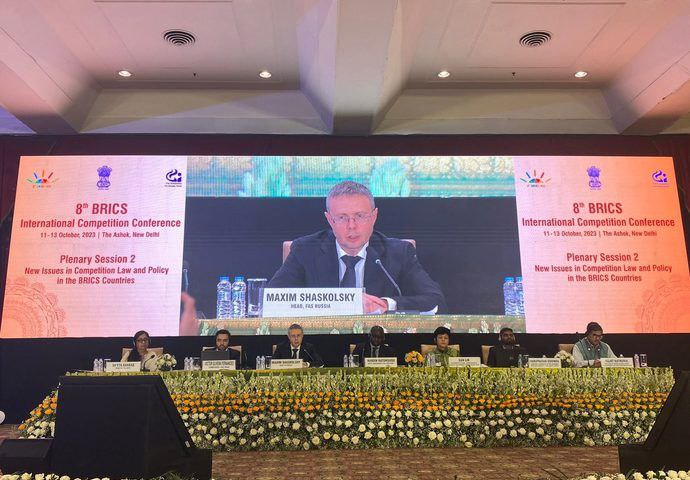
He was also supported by Hardin Ratshisusu:
"BRICS competition authorities should rely more on their own research center, which is ready to provide expert support on a range of subjects and areas where it is already a leading expert organization working at the international level."
The theme of the UN Sustainable Development Goals (SDGs) was continued at the session themed "Sustainability and Climate change: New Dimensions in Competition Law", where Alexey Ivanov delivered a report.
The term "sustainable development" in the context of antitrust regulation is mainly associated with the green agenda. However, among the 17 Sustainable Development Goals outlined by the United Nations (UN), only Goal 13 addresses the issue of climate change. The rest of the SDGs are dedicated to fighting poverty and hunger, as well as ensuring access to health care and education, reducing inequality, etc. However, antimonopoly legislation has not yet adequately covered the whole issue of sustainable development, and, most importantly, has not yet included these goals in its analytical toolkit as non-economic indicators, Alexey Ivanov noted.
The appeal to environmental sustainability has become a kind of defense against antitrust regulation for large companies, which often mask their anti-competitive practices behind this "shield". The message to focus on the environmental aspect of the SDGs comes mainly from developed countries, while for developing countries socio-economic problems are more important.
"This to a certain extent ecological bias in the application of SDGs becomes a problem for competition in the world",
Alexey Ivanov emphasized.
For example, many regulations that are developed and adopted by competition authorities in developed countries explicitly exclude sustainability parameters other than environmental ones, he added. It is necessary to remember the other 16 SDGs and incorporate them into the competition law system. Then the SDGs could become not only a defense for monopolies against regulatory interference, but also a tool for proactive enforcement. Similarly, innovation has become a tool that antitrust authorities used to justify antitrust response measures when reviewing the Bayer-Monsanto deal in 2017-2018. For example, in Russia, India and South Africa, in order to approve the deal, Bayer was also required to take certain steps to stimulate the innovative development of its potential competitors — small players in the BRICS countries.
Sustainable development values are the very non-economic interest that should be protected by antimonopoly legislation, Ivanov is convinced. In this sense, South Africa can serve as an example of a country with a progressive approach to regulation. The South African Competition Act contains provisions on public interest, and recently an updated Draft Guidelines for the Assessment of Public Interest Provisions in Mergers was published that requires “equal status” for competition and public interest concerns when carrying out reviews. The BRICS Competition Centre, together with the International Institute for Applied Systems Analysis (IIASA), is currently preparing a report on the feasibility of mainstreaming SDGs into competition regulation. The final report will be presented in November at an antitrust conference in Rio de Janeiro, organized by the Brazilian Competition Authority in cooperation with the FGV University.
